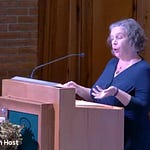My mother said I was a starry-eyed dreamer.
She didn’t mean it as a compliment.
She thought I looked at life through rose colored glasses and wasn’t being realistic about the world, other people, or my future. She worried for me because she thought I would be disappointed over and over again unless that idealism was nipped in the bud.
I tried to be practical, I really did, but this persistent belief in a better tomorrow just kept peeking through. And continues to do so. I believe people can make a difference in their own and each other’s lives.
And, yes, I know the opposite is also true. I’m not completely naïve. People can and do really hurt each other. Sometimes unintentionally by acting and speaking from their own pain, their own wounds and sometimes intentionally by acting and speaking from their own ego.
But there is power in possibility.
Positive expectations lead to better outcomes. A famous study conducted with teachers in the 1960s showed that teacher expectations of high student performance led to … higher student performance. When teachers believed students more capable, the teachers gave the students more positive interaction and more chances to succeed.1 And the students succeeded.
This applies beyond the classroom. When we believe someone is kind, well-meaning, or good we respond differently to them. We smile more, give more positive feedback, and engage in more pro-social behavior like helping and sharing. As we give to them, we are more likely to receive the same back from them.
But there is a line a starry-eyed dreamer like me has to walk between realism and optimism. I can’t tell you where that line is, because I must reassess constantly. Where do I place my trust? How much leeway do I give someone who has been known to not follow through on promises?
And that line between realism and optimism doesn’t merely apply to people. How do I face something that looks dire clear-eyed, but leaving open room for possibilities?
And there’s the rub.
In the last episode of this podcast, I recommended finding something for which to be grateful every day. Multiple times a day. Gratitude has psychological and physiological benefits. Merely looking for something for which to be grateful and not finding any still has some psychological and physiological benefits.
There also can be psychological and physiological benefits for seeing possibility. When I say the phrase “life can change in an instant” I’m often referring to the bad things that happen in life. Sudden deaths. Natural disasters. And that is true. Our life can turn on a dime for the worse.
But it can also turn on a dime for the better. A seemingly random conversation with a stranger leads you to your ideal job. An insight leads to a scientific breakthrough. Finding love.
In a time that feels chaotic and unpredictable, search for possibilities. Become the flower pushing its way through rocky soil to find the sun. If you want, use your big brain to be realistic first. “These are the facts. These are the things I have no control over and cannot change.” But what DO I have control over? What can I change? How can I impact this situation, even if that is merely to find more peace for myself?
My mother was right that I was a starry-eyed dreamer. But she was wrong to try to change that part of me. There is power in possibility. Use that power to improve your life... and the world.
Joni Miller is a writer, researcher, spiritual coach, and speaker who uses her knowledge, education, and love of all things spiritual to help others find their unique spiritual path. www.SpiritualGeography.net












